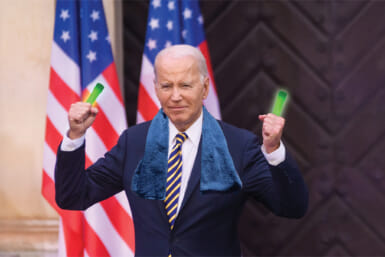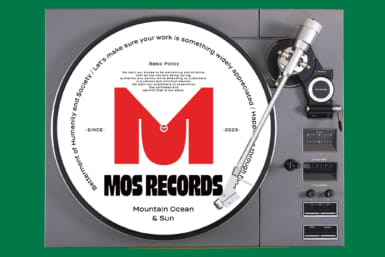Outside, the snowstorm’s winds gasped and heaved. Will Sheff listened breathlessly, aware of every creak in the log cabin’s walls. He lay curled up in the corner of that wood grain cocoon, looking out the window at snowflakes that scattered like dying brain cells, as the hallucinogens he’d just ingested blew gusts across his brain.
By Kyle Mullin
The Okkervil River frontman had ventured to his pal’s cabin in upstate New York, to escape distractions and pen songs for what would be one of the band’s finest albums, The Silver Gymnasium. Before he could finish scrawling those notes, Sheff found himself trapped inside the cabin, and within the confines of his own mind, thanks to a flurry of drugs and a raging blizzard. And yet, that inebriation paled in comparison to his true addiction: the songwriting that prompted him to travel there in the first place.
“Work is like my drug. Work is the drug I take that keeps me from doing other drugs,” Sheff says, during a recent phone interview with The Tokyo Weekender ahead of Okkervil River’s Nov. 30 performance at Yebisu Garden Hall. He admits that his typical sobriety strategy technique isn’t always successful, especially during his upstate New York trek. But, more often than not, it works well enough. He adds: “I like working more than anything else on Earth, with the possible exception of spending time with my family. Work keeps me from dwelling on sadness. If I don’t have that, I’ll reach for something less healthy.”
That studio binging has yielded a hearty output. Since their 2002 debut, Don’t Fall in Love with Everyone You See, up until the release of their seventh album—The Silver Gymnasium—this past fall, Okkervil River have earned the love of alt-folk fans the world over. Along the way Sheff has been invited to collaborate with other critically lauded artists like The New Pornographers and Norah Jones. Sheff’s work has even drawn kudos from some of his most cherished idols like Bruce Springsteen and the late Lou Reed.
But at this point, such accolades can’t compete with his psychological motivations. Being a workaholic may distract him from drugs, and preserve his future. But on The Silver Gymnasium, his greatest muse was the past.
The Power of Nostalgia, and Why Interviews Suck
Reminiscing isn’t a mere indulgence for Sheff.
“I’m interested in what nostalgia is, where it comes from and what we want out of it,” he says of The Silver Gymnasium’s dominant theme.
The album echoes that sentiment again and again—from its cover art (which could’ve been torn straight out of an early 80’s comic book), to its lyrics that reference of Atari game systems, to song titles like “Stay Young.” That yesteryear yearning is bound by Sheff’s cozy folk melodies, which have all the uplift of a child’s balloon.
The bittersweet lyrics are oddly juxtaposed with the music, which features strumming that hums like a freshly fired slingshot, and organ riffs that echo like a pool full of kiddies playing Marco Polo.
When asked about his affinity for the past, Sheff sighs like a fifth grader at the end of recess, but elaborates nonetheless (albeit with what sounds like an audible pout).
“I hesitate to boil this shit down, the record is more honest than me talking about it in an interview,” he says, before shrugging that trepidation off like a tattered security blanket: “The nostalgia on this record is about us clinging to fact that we lose everything, everything that’s good and special—like our friends and the times we felt safe and protected and carefree. The times before regret.”
Such articulate answers make one wonder why Sheff balks at most reporters’ questions. In one Q&A for the online music publication Pitchfork, he said interviews made his old albums feel like autopsies. It seems strange, for a man that is so eager to romanticize the past in his songs, to be so phobic about recalling his musical milestones.
“I just don’t want to sieve a record dry,” he says of interviews, scavenger reporters, and their pecking questions. Sheff adds that he expected such arid queries after dusting off the vintage memories that inspired his new album’s lyrics. “Something about this record is autobiographical. But that’s because I wanted to write about nostalgia, so I had to put my own life on the table. Otherwise it wouldn’t have been meaningful.”
He adds that anticipating such prying questions, and being prepared for them, are two wildly different things. But that’s because there’s a treacherous gap between Sheff’s creative and personal impulses.
“After the fact is when I go ‘oh shit, why did I do this?’ The record comes out, and people start talking about it. Up to that moment, I’m really excited. I just want to make something that people will find to be pretty, and reassuring and helpful. But I don’t necessarily want it to be about me, or it should only be about me if it’s meaningful.”
Songs as a Beautiful Shelter
Sheff’s personal lyrics describe “Nine years down in Texas/With sluts of both sexes,” on the disc’s plaintive centerpiece, “Pink Slips.” But one of the album’s subtlest, and tenderest moments is featured on an earlier track called, “Down Down the Deep River,” where Sheff sings: “father found me and my father took me home.” The bittersweet lyrics are oddly juxtaposed with the music, which features strumming that hums like a freshly fired slingshot, and organ riffs that echo like a pool full of kiddies playing Marco Polo. Such instrumentation helps Sheff deliver solace to anyone familiar with the struggles depicted in his lyrics.
But Sheff is quick to point out that he’s interested in writing richly comforting music, rather than fluffy fare. He sees a huge difference between the two and, as evidence, he cites one of his biggest influences: late 80s Van Morrison.
“You can really hear a guy trying to work it out,” he says of the Morrison songs with which he grew up. “It’s obvious (on those albums) that he’s in a good place spiritually, but he’s also very much in a searching place, trying to figure out what the big issues are in his life. That’s a comforting thing to hear, there’s something beautiful in the way that’s expressed.”
“I want you to understand, I’m not talking about making the shit that ignores the hard stuff in life.
The solace Sheff has drawn from such songs, one which he longs to pass on to new listeners, can oddly clash with his aversion to prying publicity. But, if he can console a few fans in the same way that Van Morrison comforted him, does that make a barrage of intimate interview questions more worthwhile? In short, the answer is yes. But Sheff decides to explain in detail, despite an audible twinge of reluctance:
“I’m in a place right now where I justify my existence by making things that are pretty and helpful,” he says of his current raison d’etre, before elaborating on its nuances: “I want you to understand, I’m not talking about making the shit that ignores the hard stuff in life. We need Slayer, we need The Sex Pistols . . . it’s unfettered id. And that’s valuable. We all need to get angry and vent out our most unsettling sides. So those bands are helpful. But Fleetwood Mac is also helpful, because it soothes you.”
While he may revel in consoling his fans, Sheff says he doesn’t expect the same from his own idols. Granted, he more than enjoyed meeting Lou Reed and Bruce Springsteen. But he’s content to leave the rest of his autograph book empty.
“Maybe if I got to become Jay Z’s or Van Morrison’s best friend, then that would be really special,” Sheff says, before adding: “But all I can probably be is that guy on the other side of the velvet rope. And besides, Jay Z doesn’t need any more friends.”
But Okkervil River’s audience doesn’t share that indifference. So, despite his affinity for privacy, Sheff tries to accommodate fans who approach him (even if they want to snap an obnoxious selfie on their iPhones). But his true desire lies in helping listeners who can’t afford to travel to Okkervil River shows. “Pink Slips” might seem like an obvious nod to unemployed penny pinchers. But Sheff says there’s much more to the tune than that.
“Maybe if I got to become Jay Z’s or Van Morrison’s best friend, then that would be really special . . . But all I can probably be is that guy on the other side of the velvet rope. And besides, Jay Z doesn’t need any more friends.”
He wrote that wistful anthem during his harrowing stint in upstate New York. The tune’s verses feature some of the most evocative imagery of Sheff’s career, including lines like: “The midwife of the jetlife. Oh, genie with a golden spliff. A prostitute paid in pink slips.” When he sings about those rosy scraps of paper arriving in a “haze,” it evokes the flurry of snowflakes outside that log cabin’s window.
“I went there so I wouldn’t be distracted by anything. But then I took a bunch of ‘shrooms, and started tripping during the snowstorm,” Sheff says of the circumstances behind the song. “I knew I had to write more songs to finish the album on time. I had an acoustic guitar and a drum machine. I think it was like my own anthem to myself.”
But Sheff acknowledges that many fans might see “Pink Slips” as a mantra for anyone enduring economic turmoil. And he admits that part of its inspiration may have stemmed from an experience outside that cabin, a few hours’ drive away. Late last year he visited the sobering ruin left in Hurricane Sandy’s wake, before playing a benefit at the Knitting Factory in Brooklyn for the victims of the storm.
“Most of the record was written after Sandy, so it’s a bit about that,” he says of The Silver Gymnasium’s inspirations. “But it’s also about getting older, seeing people fail, seeing friends and family die. It’s about realizing that friendship and happiness and good times are precious. They’re like a comfort, because you know they’re not going to be around all the time.”
Okkervil River will be appearing in the Hostess Club Weekender at Yebisu Garden Hall this Saturday.
Kyle Mullin is a roaming rock journalist who has contributed to music mags around the world. You can read his interviews with Iggy Pop, David Byrne and St. Vincent, Brian Wilson, Ai Weiwei and others at kylelawrence.wordpress.com. He spoke with Allen Toussaint and James Blake for Tokyo Weekender in October and June this year.
Image courtesy of ATO Records









